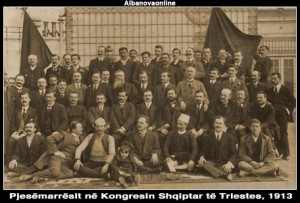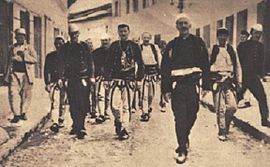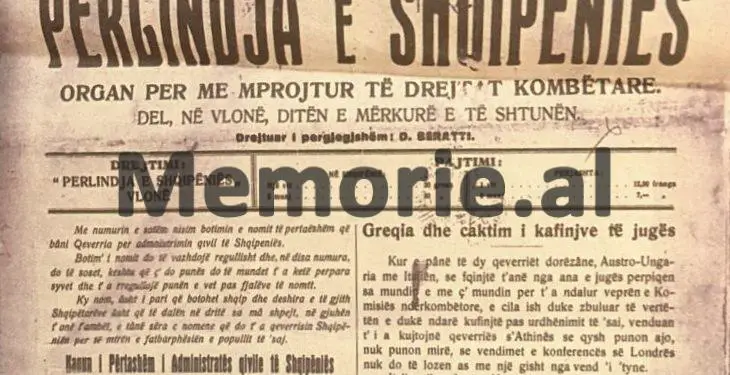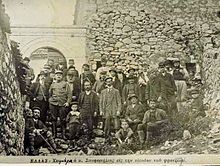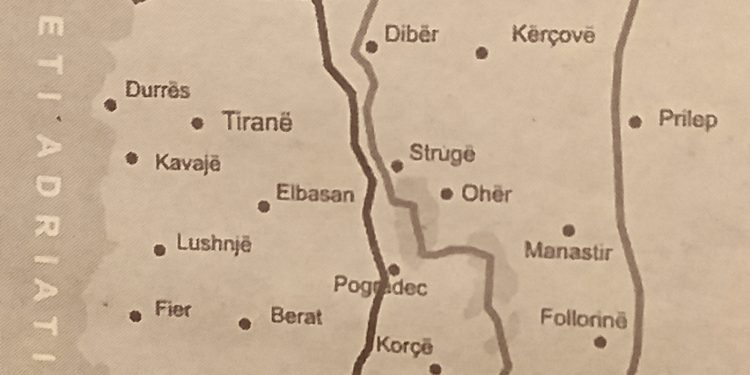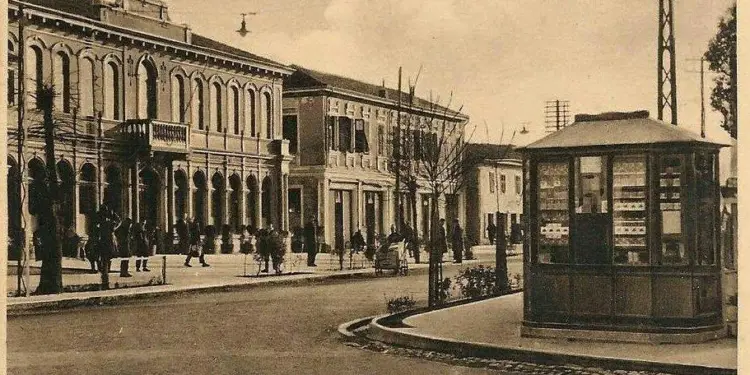Memorie.al publishes some unknown articles taken from the newspaper “Rebirth of Albania” of 1913, which in some of its issues, commented, analyzed and argued with some European newspapers, such as “Temp” of Paris, regarding the decisions of taken by the Great Powers of Europe, which had set up an International Commission for the demarcation of the borders of Albania, where during his work, especially in the South of our country with Greece, he was facing all kinds of obstacles and intrigues of Greek chauvinist circles , which at all costs sought to acquire large territories of Albanian lands. Even their appetites went so far as to claim that part of the Greek-speaking Orthodox population of Berat was Greek. Not only that but at the time the Greek government was sending a note of protest to Austria-Hungary and Italy, informing them that the complaints they had lodged against Greece for deportation were violent. of the Albanian population of the South, or as they considered “Northern Epirus”, were unfounded and did not stand. In the same situation that the Albanian population in the South of the country was at that time, there were also Albanians living in their ethnic lands in the North of Albania, which was facing the terror of the Serbo-Montenegrin massacres.
Full 107 years ago, in the third autumn of 1913, the Albanian state, which had just declared independence and established a provisional government under the leadership of Ismail bey Qemali based in Vlora, was in danger of being torn apart by the centuries-old greed of its neighbors. his, both in the South and the North. At that time, according to the decisions taken by the Great Powers of Europe, an International Commission for the delimitation of Albania was set up, which during its work, especially in the South of our country with Greece, was facing all kinds of obstacles. and intrigues of the Greek chauvinist circles, which at all costs sought to take large territories of Albanian lands. Even their appetites went so far as to claim that part of the Greek-speaking Orthodox population of Berat was Greek. Not only that, but at the time the Greek government was sending a note of protest to Austria-Hungary and Italy, informing them that the complaints they had lodged against Greece for forcibly evicting the population Southern Albanians, or as they considered “Northern Epirus”, were unfounded and did not stay. In the same situation that the Albanian population in the South of the country was at that time, there were also Albanians living in their ethnic lands in the North of Albania, which was facing the terror of the Serbo-Montenegrin massacres. All these and other events that took place in the Albanian territories of those years are widely reflected in some issues of the newspaper “Rebirth of Albania”, of November-December 1913, which was published in Vlora, by the patriot Dhimitër Berati. Memorie.al is publishing some of those articles published at that time in this article, in order to bring some panorama of the events of those years, where the new Albanian state had to go under the predatory greed of its neighbors.
“Rebirth of Albania”: Greece and the demarcation of the southern borders
When the two puppet governments saw it, Austria-Hungary and Italy said that our southern neighbors were trying their best to stop the work of the International Commission, which was uncovering the truth and dividing the borders according to its orders. they decided to remind the government of Athens, how it works, it does not work well, that the decisions of the London Conference will not be moved a single finger from their country. Italy and Austria-Hungary, saying these words to Greece, did not work against the third member of the Alliance. Germany, in order not to give any reason to those who seek to say that its opinion is not in line with that of Vienna and Rome in the affairs of the borders of southern Albania, supported the Austro-Italian research by advising, amicably, Greece, not to do work against the nominal desire (laws, our note), which the other two Powers of the League have. They say that Britain and Russia also advised Greece, in the manner of Germany. Only French newspapers found words to reprimand the Italian-Austrian grade. The grade is harsh and scares Greece. The Powers of Understanding does not know anything about the Austro-Italian note that other types would not have given permission to these governments, which, with the issue of Albania, are playing their game, to tell Greece, all that they said , and many more. Hence, a fierce controversy arose between the French press and the Italian press, a controversy that has not yet ended. Greece, in a note sent to Austria-Hungary and Italy, protests against what they say the Greek government, with its evil behavior, has done to the people of Epirus: (these are the inhumane massacres of Greek and arts in southern Albania Our note) says that the patriotic manifestations and feelings shown by the natives among all the places visited by the Commission were made by themselves and so rapidly that the government did not have the slightest need to postpone them. help; what happened in Korça and other villages, where the national consciousness of the population was more justified, did for the Commission to see for itself how powerful the connection that unites this population with the motherland, with Greece, is. The commission, therefore, says that at the head of the work, against the decisions of the Conference, they did nothing but see what language the country speaks. Then the Greek government enumerates many facts against some members of the Commission, who no longer work in a way that is pleasing to Greece; they do not say that the locals were and are Greeks, so those areas should remain with Greece. If the work of the Commission does not end by November 30 (1913, our note), says the most rated note, it is not the fault of the Greek government, because it had given and repeated, recently, its orders to facilitate the work of the Commission. What Greece says in this note are things that fall without a hitch. She cannot cover her guilt with words. We have shown many times what he has done and is doing in the occupied territories, in the columns of this newspaper, showing the names and the time and place of the place where those works took place against which we have wept and, the Dorzan governments, have protested in Athens. The guilt of the guilty is not washed away by saying: those who weep against our government are not right. As for the insults to the representatives of Austria and Italy, Mr. Doughty Ëyllie, Chairman of the Commission, telegraphed to his government and told him that the statements of the Greek government against some delegates are completely false, proving that England does not understand how this works. These peaceful and fair words of the Chairman of the Commission, impressed in England and distorted the opinion of those there to see the right step of Italy and Austria-Hungary in Athens. In Greece’s response, we see another thing strongly to note. Greece does not affect the essence of the Austro-Italian note at all. This essence has two points: On December 31, the Greek army must leave all the remaining areas in Albania
All those villages in Albania where the Commission could not do its job well enough will remain in Albania.
Mr. Panas, in response to the Austro-Italian note (the answer which, hoping to bring about a change in the minds of the two governments, was made in writing, despite the Austro-Italian research being said orally), did not say not half a word on these two very important points. It seems that Greece, rather than showing the lady and opposing the just demands of Italy and Austria, had to recognize the opinion of the Powers of Understanding on this issue. It goes without saying that this view cannot be opposed to the views of the governments of Vienna and Rome, because these governments have no choice but to remind Greece of the decisions of the London Conference, decisions approved by both the Trinity and the Triune. Will France, Russia, or England show up against the first decisions? Will Sir Edward Gray want the foundation of the agreement to be broken, which he could barely find between those who support the rights of Albania and those who defended the demands of Greece? This is unbelievable. Apart from England, it seems that Russia is not in the mind of those who want, with a second conference, to overturn the decisions of the former. Mr. Kokozeff’s remarks should lower his head in the face of Europe’s will, as did Serbia.
When all the Great Powers, wrapped in London, were able to understand the work of creating an independent Albanian state and its borders at all, how could the members of the Commission not be able to agree on issues that are not so important? This is what the President of the Russian Council said, and today’s news confirms that after much talk about the disruption of the London Conference and the holding of the Conference again, all the great powers are well understood and in a mindset that is fundamental. of Europe’s decisions on the work of the southern borders, not to be shaken and the Border Commission, after the orders it has from the conference and after those now taking, the delegates, each from his own government, must finish the work by the end of this The month and the Albanian issue are all over by December 31 of next month.
The Greeks of Berat and Mr. Zograf
The General Ruler of Ioannina, Gjergj Zografi, from the Qestorat of the Sunnah of Sovereignty of Gjinokastra, told Mr. De Zessen on the issue of Epirus and the International Commission to mark the borders of Southern Albania, these words which We took them from the Greek notebook “Nea Imera”, “The real fault was against the Epiriots, Greece, pushed by some Powers not to burden Europe, stopped the advance of the army by not letting the Greeks (like) the Sandzak “Berat, whose number reaches up to 40 thousand. For revenge against any injustice, he left to Albania areas liberated from Greece and whose natives are mostly Greeks “. Woe to the “Temp” of Paris for what it really expects. Mr. Zograf calls the locals of the city of Berat and all of his district Greek. What about? Definitely from the language. In Berat they speak Greek after the mind of Mr. Zograf and in Myzeqe again Greek. But let Mr. De Zessen find out the truth from us and not from Mr. Zograf, who, despite being Albanian and an Albanian son, has denied his and others’ nationality, that the natives of Berat and Myzeqe are as Greek as they are. the natives of Paris Greek or Albanian and the Greek language know as much as the natives of Paris know Greek or Albanian. And really. Mania, since it is a disease, which, due to the turmoil of brain turmoil, appears in a way that the conquered by it, every thought and every feeling lowers before a thing he has in mind and desires. The healthy man sees in dreams, sees only when he sleeps: but, take them, ay who suffers from mania and is followed like a cow by zegal, he also sees the day, when he cries, when he eats and when he speaks. Are they achieving what this dull body wants?
Never. His dream, then, comes true when his life takes a pound. The ancient Greeks, not having a special medicine (medicine, our note) to mark the mania, sent those suffering from this disease to England, where you find a herb called elevator, which they ate and fattened. But we Albanians, such a bar, unfortunately for those who suffer like the Avdhirs of the old days from mania, have nothing but the tombruk and the monasteries. Driven by this, therefore, some local Greeks could not be found, believing that we live under a non-Albanian, but Turkish government, which we had, through the Patriarchate, a clown and a toy of their volley, rise line of visas of the Albanian state and this state became. We are confident that this state will prosper and its condition will be strengthened. The Provisional Government, formed by the Albanians at a dangerous moment, maintained this strong stance, despite great hardships on the part of the money, the army, and the former, surrounded on all sides by enemies who wanted to lose it. , proves to us that Albania, with a strong government, will ensure its progress forever. The issue of the prince is being resolved and will soon be over for our joy and the happiness of the New State.
Terrorism among the countries occupied by Serbs and Greeks
An English newspaper, the Manchester Guardian, publishes horrific articles about what the Serbian government is doing in the occupied territories, which, as this notebook proves, is showing that Serbia’s rule is worse than Turkey’s. This newspaper, which is one of the oldest and most serious liberal English notebooks, publishes a nom (law, our note), a strict exercise that Serbia has put in place in Skopje and Bitola, with which they are sentenced to five years in prison, and with hard work (forced labor, our note), all those people who do not show up to rule the insurgents, and with ten years of hard work, those who dare to speak a word against the officials. A knot (article) of this extraordinary nomination entitles the prefect to impose police penalties, and imposes penalties of no more than three years in prison, and tightens the work for those who break the norms. Serbia, the newspaper says, is not a vent with civilized people and 80% of those living in Serbia are illiterate. It is now necessary to give to the occupied territories the ruler and the clerk, who are found to be on a par with most of the people. Serbia, the best of them do not want to go into exile, in Macedonia, and it follows that officials who do not know either government or administration, to take office, as if they were second kings. These things are described by a Protestant minister, who saw with his own eyes the condition of those lands. That every four or five villages, they have at their head a clerk who has six or seven others under his command; all the people whose lives are full of evil that have worked. These, having to break into the houses of the villages in order not to have a weapon, steal and steal everything they find valuable. The people have been violated in a vile way and the evils are on the agenda. In a village of one hundred and ten families, I have been forced to pay 6000 francs given (vergji) and now they are asking for another 2000. The priest of this village, in order not to be deported, was forced to pay 1500 francs. Poor Kurbetchins returning from the United States are forced to pay 200 to 400 percent francs to be allowed to return to their homes, and this requires an increase in the terrorism of government-collected committees. who has been called upon to terrorize the people? Even among the areas occupied by the Greeks, as the newspaper writes, things are not going well. Among the districts of Thessaloniki are close to 3,000 Bulgarians imprisoned on suspicion of being of Bulgarian nationality. The number of those in the island’s prisons is higher. They have been in prison since July and are awaiting trial. Some of them died in prison. The paper says that if the Turks had acted in this way, Europe would have risen up against them, but we need to believe that Serbia and Greece are too powerful to be reprimanded, and the atrocities committed by Christians are being honored. What have we written that these foreigners have managed to see, but what have our brothers seen who have suffered and are suffering from the evils of Serbs and Greeks?
Defining the borders of Southern Albania
She would like us to present the news that her correspondents from Southern Albania give to the newspaper “Temps”. Here is the news from Temps, what confusion the Greeks use in the border issue, even though the Paris newspaper is the first tool of Greek and Serbian intrigue: On the 23rd of this month, we telegraphed to Temps from Ioannina, that the people of Brondar have protested against the ways that the Border Determination Commission of Southern Albania is bringing, crying, among other things, that the members of the commission were some time ago members of a gang that has drowned a woman in Borovo. The chairman of the commission has also been informed that the behavior of some members (!!!) is adding to the anger that reigns in these areas and that a habit that cannot be broken prevents foreigners from maturing with women and Tyne. The mayor replied that they were giving a lot of importance to some unexplained events and that he regretted that this habit had led to a ban on the work of the commission and that it was almost a policy for the village elder to be found when the commission spoke to women. , o a priest in the middle. Again on the 23rd of this month, the newspaper “Temps” receives a transcript from Kolonje, from its correspondent, where it says that the International Commission has visited the village of Qafëzezi. The look of this village was short-lived, as the commission asked only a few villagers to look at them and talk to their wives, but they replied that: women are in the field working. After eating lunch, the commission continued its journey and visited the village of Shtika. The villagers, realizing that scandals (bad jobs) had occurred, among the areas of Brondan that the commission had visited, were very angry. The delegates were greeted with shouts and shouts: “Unity or Death.” After the commission members had previously asked the women of the village, she replied: “We are Greeks, what do you want me to know more? We are not to be sold. ” The commission left immediately and went to Ersekë. This morning, the villagers of Qafëzezi went to the governor of Kaza and protested against the behavior of a member of the commission, who, while serving as a translator to his colleagues, was giving more anger to the answers of the villagers, especially to his words. belong to the issue of women, who speak only Albanian. The newspaper “Temps” publishes these comedies of the Greeks as if they had been telegraphed by its correspondents; but other notebooks, this identical news, tell us that they were given by a statement from the Athens Agency. “Corriere de la sera” comments on this news in this way: this communiqué from Greek sources is taken in a more meaningful way, because it is being confirmed that the International Commission for the Borders of Albania, among how many countries it goes to, cannot finish its views. properly on the ethnic character of the inhabitants, due to the more frightening confusions and testimonies of the Philo-Eleni; whose manner, as a transcript of the “Stefan” Agency from Bitola started yesterday, is the kind that is believed to be very good, which is required to give a Greek face to the villages that are./Memorie.al




